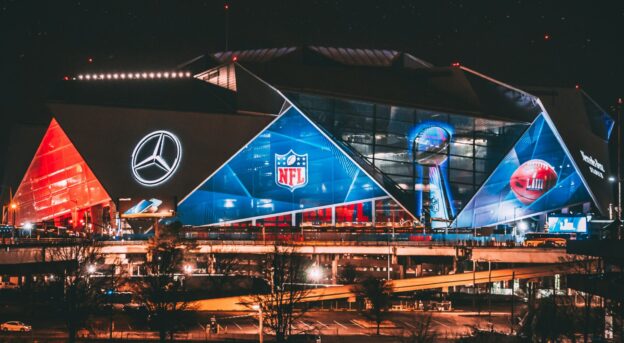Estee Segan – The Super Bowl halftime show is not only a highly anticipated performance but also a platform where artists make cultural, business, and legal statements. Beyond the artistry, Kendrick Lamar’s Super Bowl LIX halftime performance on February 9, 2025, underscored tensions in the music industry, particularly his public dispute with Drake and the ongoing defamation lawsuit involving Universal Music Group (“UMG”). Notably, his subtle references to Drake’s defamation lawsuit against Universal Music Group (“UMG”) and his choice of lyrics raised significant legal questions about defamation in music, corporate responsibility, and the increasing role of artificial intelligence (“AI”) in the industry. Rather than suing Lamar directly, Drake filed suit against UMG, alleging that the label facilitated and profited from the distribution of Lamar’s diss track “Not Like Us,” which contains pointed allegations about Drake’s conduct.
The tension between Kendrick Lamar and Drake has escalated over the years, culminating in the release of Lamar’s diss track “Not Like Us,” which contains pointed allegations against Drake. In response, Drake filed a defamation lawsuit against UMG, claiming the record label promoted and monetized content that was harmful to his reputation. The lawsuit raises critical issues about the liability of record labels in artist disputes and the broader implications for how the music industry governs artistic expression.
The case between Drake and UMG underscores the tension between artistic freedom and defamation laws. In the United States, a defamation claim must prove that the statements made were false and caused reputational harm. However, music – particularly diss tracks – often incorporates hyperbole and metaphor, which courts may not interpret as literal statements. If Drake’s lawsuit proceeds, it could set a precedent for how courts balance artistic expression against alleged defamatory content, potentially influencing how labels handle controversial releases in the future.
Furthermore, UMG’s involvement in the feud highlights the business considerations behind music distribution. Record labels typically benefit from increased streaming numbers and public attention, even when a release is controversial. However, as lawsuits become more frequent, labels may need to reconsider their role in artist disputes. Could labels be held liable for distributing music deemed defamatory? If so, record companies may implement stricter content review policies, which could have a chilling effect on artistic expression.
Additionally, the feud has also intersected with another major legal issue in the music industry: AI-generated content. Drake’s earlier diss track, “Taylor Made Freestyle,” featured AI-generated vocals, sparking legal backlash from the estates of deceased artists. The growing use of AI in music raises complex intellectual property questions. Do artists have the right to use AI-generated versions of other musicians’ voices? How should record labels and streaming platforms regulate AI-generated music? As the legal landscape evolves, it will likely shape how AI is used in future music production and distribution.
The controversy has not gone unnoticed. Legal analysts and commentators have questioned whether Lamar’s performance crossed a legal line. In Vanity Fair, one critic noted that Lamar’s stage presence “blurred the line between performance art and legal provocation.” Meanwhile, public reaction has been overwhelmingly supportive of Lamar, with Page Six reporting that fans interpreted his choice to skip over certain lyrics as a “strategic flex” in response to the legal pressure. Still, neither UMG nor Lamar have issued formal statements, suggesting a cautious corporate posture amidst ongoing litigation.
Beyond these concerns, the lawsuit also highlights the evolving nature of artist-label relationships in the digital age. As streaming revenue dominates and social media amplifies public disputes, record labels must balance supporting their artists and mitigating legal risk. If labels begin exerting greater editorial control over music releases, they may face pushback from artists who prioritize creative freedom. Conversely, if they take a completely hands-off approach, they could face increased exposure to defamation claims and reputational damage.
Kendrick Lamar’s Super Bowl performance, though entertainment-driven, highlights critical legal and business considerations in the music industry. First, the ongoing defamation lawsuit could redefine legal standards for diss tracks and music-based disputes. Second, record labels may need to reassess their responsibility in distributing controversial content, potentially leading to stricter corporate policies. Finally, AI’s growing role in music continues to raise pressing intellectual property questions that regulators and courts must address as technology evolves.
For businesses and legal professionals, these developments signal a need for closer scrutiny of industry contracts, corporate policies, and the legal implications of digital content creation. As the music industry navigates these changes, legal experts will play a crucial role in shaping its future direction.
Beyond its legal implications, this dispute also highlights a shift in how artists leverage major cultural events to shape business and legal narratives. By addressing his feud with Drake on one of the world’s biggest stages, Lamar demonstrated the power of live performances as a tool for influencing public discourse. This trend raises important questions for industry stakeholders about the role of performances in legal and reputational strategy. While Lamar’s Super Bowl performance was a cultural moment, it also serves as a case study in the intersection of entertainment, law, and business. The legal battles and corporate considerations emerging from his feud with Drake highlight the complexities of modern music disputes. As legal precedents continue to develop, artists, record labels, and legal professionals must navigate an increasingly intricate regulatory landscape that blends artistic expression with corporate responsibility and advancing technology.


